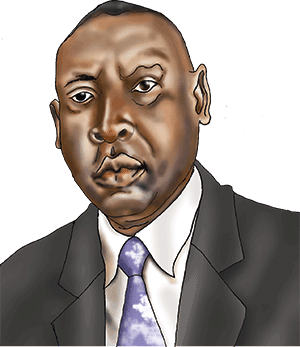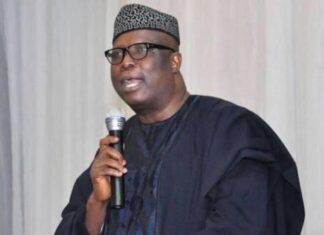Kanmi Ademiluyi takes a look at a life bordering on scholarship
The delightfully erudite Professor Mike Ikharile undertook the Esan rite of passage into the Elders’ council (The I-R-V-E-N) robbing ceremony yesterday, the 13th of December, 2014. Quite a milestone for a noted scholar, whose punditry in his must read newspaper columns, makes him to stand out in the commentariat. The rite of passage undertaken by a cosmopolitan intellectual is not as contradictory as it sounds on the surface. Prof is a committed Esan, very proudly so, never far from his roots. Here tradition and modernity are not in conflict.
 Yesterday’s Iruen (clothing) ceremony is a critical milestone in Esan land. The ceremony is highly celebrated across Esan land due to its common significance. It is performed by a man of means who is mature in age and possibly with children. The nature and customary requirements of the ceremony vary from phase to phase, depending on “common hardship and necessity”. The central significance here is that it is considered to be a thing of joy to attain the age required for the ceremony.
Yesterday’s Iruen (clothing) ceremony is a critical milestone in Esan land. The ceremony is highly celebrated across Esan land due to its common significance. It is performed by a man of means who is mature in age and possibly with children. The nature and customary requirements of the ceremony vary from phase to phase, depending on “common hardship and necessity”. The central significance here is that it is considered to be a thing of joy to attain the age required for the ceremony.
Once successfully performed, the social status of the celebrant within the community changes. Significantly, yesterday’s ceremony means that the unfailingly polite, amiable Prof could be made the Odiomwale if he becomes the oldest man in his village. Whatever providence holds, from now on he is strictly regulated by certain laws calculated to make him live honourably for the rest of his life. Culture aside, this is somewhat superfluous. For Ikhariale’s integrity has always been acknowledged as unimpeachable. This is why he has kept his nose clean in spite of the murkiness of Nigeria’s contemporary firmament.
The professor who is a visiting fellow at the Harvard Law School has for long made a notable contribution in his areas of specialisation spanning constitutional law, law and development and regulatory impact analysis. He has shown strength-in-depth as an accomplished academic with considerable international research and teaching exposure. In a seminal trawl he has gained national recognition in legal curriculum development and general university administration.
A significant contribution is the path breaking introduction of the multi-disciplinary post-graduate degree in law programme, the Masters in Legal Studies (MLS). The programme is designed for those stepping into managerial and public formulating positions in both the public and private sectors of the economy to the Nigerian Legal Educational System in 1995 while he was serving as the director of Post-Graduate programmes of the Lagos State University. The initiative has now been spread to several law schools in the country.
Another significant undertaking is the first wholesale annotation of the entire statutory laws of a state government by the successful annotation of the “Laws of Delta State”. He is presently engaged in the wholesale annotation of the Laws of the Federal Capital Territory. He also designed and initiated the centre for human and people’s rights at the law school, University of Venda, South Africa while on a sabbatical appointment.
Yesterday’s ceremony comes during a critical juncture for the nation for which Ikhariale had contributed so much. For someone who has seen a lot and has been through a lot, he obviously finds it difficult to pinpoint what can be described as a defining moment in his life. His reflection is philosophical. He sees life as a continuum in which every day is just an installment of a life-long journey.
“Between birth and death so much would have happened that searching for a single event that would surpass the rest is a herculean task.” He emphasises that the question is about “so far” and not a complete inquiry into what the entire life has been. ‘’I would therefore say my defining moment was the day I learnt to read because to a large extent my life has been dictated by issues bordering on scholarship.”
Having held visiting fellowships at leading universities abroad, the temptation cannot be resisted to ask Prof to make a comparative analysis with our own weather-beating institutions at home. He is not surprisingly at a crossroads here between diplomacy, espirit de corps and not pulling the punches.
‘’It is really not possible to compare universities abroad with what we have these days in Nigeria. Nigerian tertiary institutions and, in particular, the universities like anything in the country have fallen on bad times. Several theories have been advanced to explain the phenomenon. Some have pointed to the fact that for too long the country was held hostage by an anti-intellectual military class that ruled the country through dictatorial means. Others have pointed out that flowing from the first, there was a deliberated humiliation of scholarship by the ruling elite under the military through all manners of disregard, underfunding of universities and the deliberate denial of the much needed materials for quality teaching and research within the campuses.
You will recall that at independence in 1960, the professors at University of Ibadan were earning more than the ministers in Tafawa Balewa’s government. But over time, their pay was reduced to peanuts which could not recruit and retain quality academics within our campuses. Ignorance is the reward for killing teachers.”
Finally, there are those who reason that the undue materialism that engulfed the nation diverted attention away from education to quick money. “What is more than the ruling class no longer have the cerebral Awolowos and Ziks to ignite their curiosity for learning and their places were taken by soldiers who in all probability were drop-outs before they enlisted in the army and now that they have found themselves in power. They did everything to undermine quality education. Now we have schools that cannot deliver with respect to the impacting of the requisite competencies and skills on their graduates. There is not a single university in Nigeria that minimally meets the standard much less world standards. That is why you hear of first class graduates who cannot undertake graduate studies abroad without much of remedial actions. That was not the case in our time. Perhaps we were lucky.’’
Ambivalence is reflected in his observation about the country’s future. How does he see Nigeria’s future – ‘’I would say it is bright, certainly not as bright as I would have loved to say for the simple reason that we have not started putting in place the necessary remedial policies that would redress the mounting problems of underdevelopment confronting the nation. The moment we begin to sincerely address them through government policies, the brightness of Nigeria’s future would begin to manifest.’’ The new status fits the man.In the years ahead we will still hear a lot from this remarkably clever, astonishingly well read scholar. Ikharile still has a lot to contribute to community, society and nation. This charmingly self effacing scholar and gentleman has many,many more miles to go.













